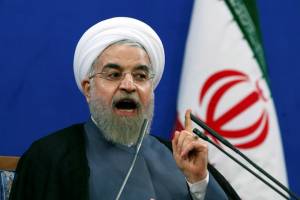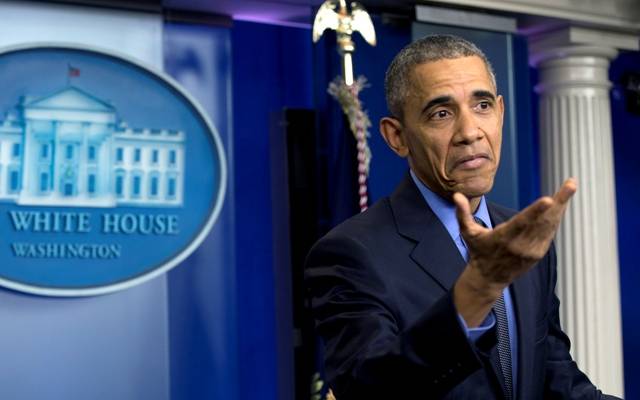Obstinate in maintaining his nuclear deal with Iran at all cost, Obama is bending to Iranian pressure and delaying any response to Iranian belligerence and blatant breach of UN resolutions.
The Obama administratione has backed down from responding to the Islamic Republic’s belligerent missile development program and its breach of UN resolutions.
The White House claimed on Saturday that it has more diplomatic and technical work to do before it will announce any sanctions in response to ballistic missile launches by Iran.
The US is considering designating a number of additional targets for sanctions related to Iran’s ballistic missile program, adding to the list of about 10 they have already marked.
Congress has been notified of those deliberations.
Some lawmakers have criticized the administration for what they describe as delayed punitive action in response to Iran’s recent missile tests.
“If the president’s announced sanctions ultimately aren’t executed, it would demonstrate a level of fecklessness that even the president hasn’t shown before,” said Congressman Mike Pompeo (R, Kan.), a leading critic of the nuclear deal, in an interview.
Ben Rhodes, a deputy national security adviser, said the nuclear deal that the US and others negotiated with Iran last year to prevent it from developing a nuclear weapon will not impede future sanctions.
“The fact of the matter is we have additional work that needs to be done before we would announce additional designations, but this not something that we would negotiate with the Iranian government,” Rhodes said. “They don’t get a say in who we impose sanctions on.”
Rhodes said the additional work the US is undertaking is not based on push-back from Iran. “We fully expect them to protest our sanctions. They do that when they know we’re preparing them. They do that after we make announcements of designations.” In this latest case, he said, “we just have additional work that we need to do as a US government before we would announce additional designations.”
The Wall Street Journal quotes officials who said the Obama administration remains committed to combating Iran’s missile program and that sanctions being developed by the US Treasury Department remain on the table, but offered no definitive timeline for when the sanctions would be imposed after the decision was made Wednesday to delay them.
Iran Accelerates Weapons Program
In the meantime, Iranian President Hassan Rouhani on Thursday ordered Defense Minister General Hossein Dehqan to accelerate the development of the country’s missile capabilities in response to the reports of new US sanctions against Tehran’s defense program.

Iranian President Hassan Rouhani. (AP/Ebrahim Noroozi)
“As the United States seems to plan to include the names of new individuals and firms in its previous list of cruel sanctions in line with its hostile policies and illegitimate and illegal meddling in the Islamic Republic of Iran’s right to reinvigorate its defense power, the program for the production of the Armed Forces’ needed missiles is required to continue more speedily and seriously,” Rouhani’s written order to the Defense Minister read, according to the Iranian Fars News agency.
“In case such wrong and interventionist measures are repeated by the United States, the Defense Ministry will be duty-bound to make use of all possibilities to bring up new planning to develop the country’s missile capability,” including the development of new types of missiles.
President Rouhani further reminded that Tehran has time and again underlined all throughout the nuclear that it would “never negotiate with anyone about its defense power, including the missile program, and would never accept any restriction in this field, emphasizing its entitlement to the legitimate right of defense”.
“It is crystal-clear that Iran’s missile program is not at all a part of the Joint Comprehensive Plan of Action (JCPOA) and this is acknowledged by the US officials as well,” the presidential order read.
Iranian leaders have repeatedly warned the US in recent months that any new sanctions on Iran, including penalties related to missile development, could undermine the deal’s implementation.
Asked to comment on Rouahni’s step, State Department spokesman John Kirby said the timeline for missile-related sanctions was unrelated to threats made by Iran the broader nuclear deal recently reached with Tehran. The State Department offered no explanation for the delay.
“We’ve been clear from the outset that—outside the parameters of Iran’s nuclear program—we would continue to take appropriate actions to address Tehran’s destabilizing behavior,” Kirby stated.
Tensions between the US and Iran already rose this week after the Pentagon rebuked Tehran for testing rockets near an American aircraft carrier and French warships in the Strait of Hormuz in the Persian Gulf.
By: AP and United with Israel Staff
